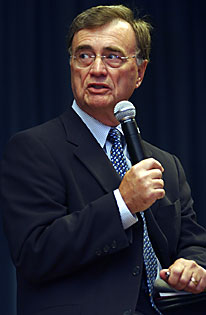 |
|
DAVID HARDEN/Arizona Daily Wildcat
|
Arizona Health Sciences Center Vice President Raymond Woosley talks to nearly 100 people at a town hall forum held at DuVal Auditorium yesterday afternoon. Woosley says that UA must expand to produce more healthcare professionals to combat a shortage.
|
|
|
By Tim Lake
Arizona Daily Wildcat
Thursday, November 6, 2003
Tuition revenue could help fund increases in faculty salaries, Likins says
UA Vice President for Health Sciences Dr. Raymond Woosley told an audience of about 100 people yesterday that the UA must grow to handle a shortage of healthcare professionals in Arizona.
The problem is getting worse, especially because Arizona is not keeping those who graduate from the in-state health care programs, he said.
"It's almost a perfect storm about to hit Arizona," he said. "We are a net exporter of physicians and health care providers."
At the town hall, where Woosley spoke along with President Peter Likins and Provost George Davis, Woosley said that negotiations are in progress with one of the three candidates for the College of Medicine dean position, who administrators hope will help address the shortages.
Likins then drew a laugh from the crowd when he quipped, "No word yet on the football coach."
Administrators also discussed faculty salaries at the town hall.
Davis said the university must get creative with salary packages and incentives to progress towards filling the salary gap.
The university needs to reduce its dependency on state funds and pay for salaries with growing revenue sources, Likins said.
At the September Arizona Board of Regents meeting, Likins submitted a request to the legislature for $15 million to fund faculty salaries.
Likins said that one possible source of revenue to help fund faculty salaries is tuition, which until last year's $1,000 tuition hike, was not a growing source of revenue.
"We're beginning to ramp (tuition) up," he said.
Another potential source of funds for the university is research, Likins said.
"Research is a big part of our mission," Woosley said.
But Likins said that because there is an inadequate number of healthcare faculty, the faculty must spend much of their time serving patients instead of teaching and doing research.
Supporters of two programs that are set to get the axe because of Focused Excellence were on hand at the town hall.
One of these, the Medical Technology Program, is quite small and does not require much funding, said Deborah Wyckoff, the interim director of the program.
"You could have supported our program for two years by not re-seeding the football field," she said.
This is not an accurate comparison since the athletics department has its own money, and there could be no trade off, Likins said.
Woosley said that in order to maintain the quality of the healthcare program, "We had to jettison something."
Although a handful of people who were at the forum with their red, "Save the school of planning," T-shirts did not speak, their presence was acknowledged by Likins.
Likins said he understood the pain the affected departments are going through and that public forums like the town hall remind everyone of the "starkness" of the situation.
"We have to find ways to move every loose dollar to the priorities," he said.
